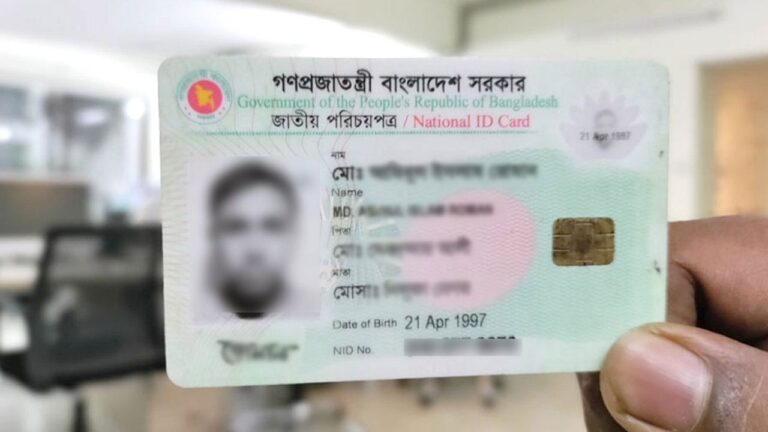2 Arrested on Charges of Smuggling NID Information

2 Arrested on Charges of Smuggling NID Information. In a shocking revelation, two employees of the Election Commission in Bangladesh have been arrested for allegedly smuggling National Identity Card (NID) information in exchange for money.
This incident took place at the Upazila Election Office in Raipura, Narsingdi, where the accused were reportedly involved in the illegal transaction of sensitive data. The investigation committee, formed by the National Identity Registration Division, took swift action, leading to their arrest.
Election Commission Employees Involved in NID Data Smuggling
The arrested individuals have been identified as Nahidul Islam, a data entry operator at the Raipura Upazila Election Office, and Ashiqul Islam, a scanning operator from the Purba Brahmandi area of Narsingdi Municipality. Their illicit activities came to light during a day-long drive conducted by the investigation team at the Election Office on March 19.
According to Deen Mohammad Russell, the acting Upazila Election Officer of Raipura, both employees had been engaged in the illegal sale of NID information to unauthorized individuals. This alarming breach of sensitive data has raised concerns about security protocols within the National Identity Registration system.
Investigation and Arrests by the National Identity Registration Division
The National Identity Registration Division swiftly responded to the allegations by forming a four-member investigation team. The team comprised Wing Commander Saad Waiz Tanvir, Project Director (IT) of the Election Commission Secretariat IDEA; Wing Commander Mohammad Ariful Islam; National Identity Registration Division System Enlist Engineer; and Assistant Maintenance Engineer Mehedi Hasan. They carried out an extensive search and interrogation process at the Raipura Upazila Election Office.
During the investigation, the accused employees were questioned under strict security measures. Their mobile phones were turned off to prevent any communication or further data leaks. Shocking financial evidence was discovered, revealing that Ashiqul Islam had transactions worth 12 lakh taka in his bKash account, while Nahidul Islam had received 2 lakh taka over the last six months. This financial trail provided solid proof of their involvement in the illegal sale of NID data.
How the NID Data Smuggling Was Conducted
The modus operandi of these employees involved unauthorized access to the National Identity Registration system, extracting personal information of Bangladeshi citizens, and selling it to interested parties. These buyers could potentially misuse the information for various fraudulent activities, including identity theft, financial fraud, and other criminal activities.
Data smuggling of such critical information not only violates data protection laws but also poses a significant national security threat. The Election Commission is responsible for safeguarding the NID database, which contains crucial personal details of millions of citizens. The breach indicates vulnerabilities that need immediate addressing to prevent further exploitation.
Legal Actions and Police Intervention
Following their confession and the discovery of financial transactions linked to data smuggling, both Nahidul Islam and Ashiqul Islam were handed over to the police. The Officer-in-Charge (OC) of Narsingdi Raipura Police Station, Adil Mahmud, confirmed that the accused were taken into custody late at night.
A formal case was filed by Upazila Election Officer (acting) Deen Mohammad Russell at Raipura Police Station. Legal proceedings have been initiated, and authorities are conducting further investigations to determine whether more individuals or an organized network is involved in this illicit operation.
Growing Threat of Identity Theft and Data Smuggling
Data smuggling has become a growing concern in Bangladesh as cybercriminals increasingly target personal and financial information. The illegal trade of NID information can have severe consequences, such as:
- Identity Theft: Stolen NID data can be used to create fake identities for fraudulent transactions or criminal activities.
- Financial Fraud: Unauthorized individuals can use NID details to open bank accounts, apply for loans, or conduct financial scams.
- Illegal Activities: Misuse of national identity data can aid in terrorism, money laundering, and other illegal operations.
Given these threats, it is crucial for authorities to implement stringent cybersecurity measures to protect citizens’ personal information.
Measures to Strengthen Data Security
To prevent further breaches and ensure national security, the Election Commission and other relevant authorities must take immediate steps to enhance data protection. Some key recommendations include:
- Enhanced Cybersecurity Measures: Strengthening firewalls, encryption techniques, and access control mechanisms to safeguard the NID database.
- Strict Employee Background Checks: Conducting thorough background checks and monitoring employees handling sensitive data.
- Regular Security Audits: Periodic security assessments to identify and fix vulnerabilities within the system.
- Legal Framework for Data Protection: Enforcing stringent laws against data breaches and imposing severe penalties on offenders.
- Public Awareness Campaigns: Educating citizens about data privacy and the risks associated with identity theft.
Government’s Response and Next Steps
Following the arrests, government officials have assured the public that stringent measures will be taken to prevent such incidents in the future. The National Identity Registration Division is expected to introduce more robust security protocols and improve surveillance mechanisms within the Election Commission offices across the country.
The authorities are also considering implementing advanced biometric verification and AI-driven monitoring systems to track any unauthorized access to the NID database. This proactive approach will help ensure that citizens’ personal data remains secure and protected from potential misuse.
Conclusion
The arrest of two Election Commission employees for smuggling NID data in Narsingdi highlights a serious breach in Bangladesh’s data security system. The incident serves as a wake-up call for authorities to reinforce cybersecurity measures, conduct rigorous investigations, and impose strict penalties on those involved in data theft.






